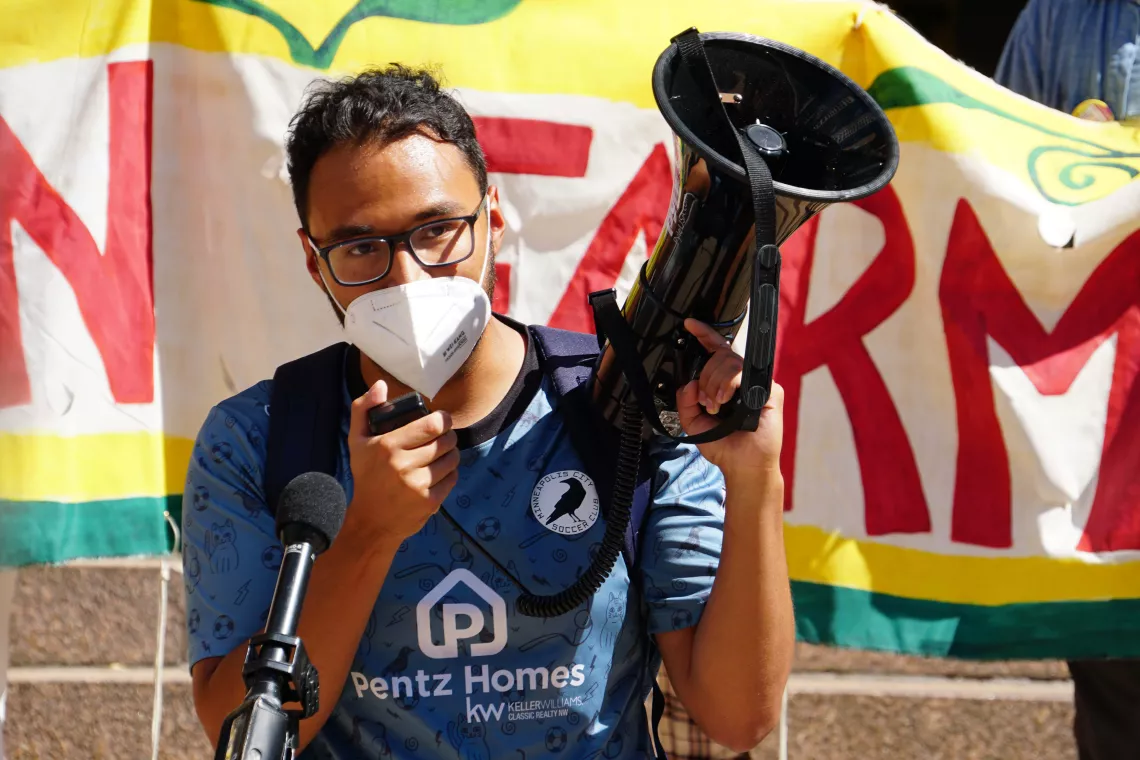
Photo credit: MCEA/Adam Reinhardt
Satish Desai
The unused Roof Depot warehouse in the heart of the Minneapolis Southside Green Zone sits atop an arsenic plume from a pesticide plant that operated in the East Phillips neighborhood a century ago.
Parts of the neighborhood were declared Superfund sites and most of the arsenic was cleaned up, except under the Roof Depot warehouse, where a parking lot and concrete flooring contained the pollution. But now Minneapolis Mayor Frey and some members of the City Council want to demolish the building to expand an adjacent public works facility to add a parking garage for employees and diesel trucks.
In 2017, Minneapolis launched its Green Zone initiative to support the health and economic development of its most marginalized communities, including East Phillips. But the city’s controversial plan for the warehouse site would do the opposite, exposing the neighborhood to underground arsenic and even more vehicle pollution.
This is a big deal: a recent study found that air pollution kills far more people in the Twin Cities than homicide. East Phillips has some of the worst air quality in Minneapolis. Those deaths are disproportionately concentrated in the Minneapolis Green Zones.
Meanwhile, neighborhood leaders have an alternate plan for the site that would meet the goals of the Green Zone; they want to turn the Roof Depot into an indoor urban farm that would bring green jobs, generational wealth, and affordable housing to one of the most polluted and impoverished parts of Minneapolis.

outside City Hall. Photo credit: MCEA/Adam Reinhardt
For eight years, through lawsuits and direct action, the East Phillips community has struggled to stop the city from increasing pollution. This summer, they brought Minneapolis leaders to the negotiating table. But the city proposed a compromise that is simply not acceptable. Part of the site would be an urban farm vision, but the building would be demolished, risking arsenic leaks. And polluting city trucks would use the site. This compromise proposal still fails to live up to the city’s Green Zone commitments.
Sierra Club Role
The Sierra Club has supported the community’s vision all along. Recently, we became active allies in this, one of the clearest environmental justice fights is Minneapolis. You can help by contacting Minneapolis City Council members, supporting the East Phillips legal action fund, and sharing this story through video and social media.
Since I joined this fight as a Sierra Club volunteer a little over a year ago, I have come to see Minneapolis with new eyes. This April, on an annual brewery crawl with friends in Northeast Minneapolis, I noticed how many breweries are in old warehouses. I saw how warehouses in more affluent parts of the city were repurposed into fashionable office spaces and other amenities that enrich their communities. The stark contrast between these redevelopment efforts and Minneapolis’ plan for the old Roof Depot warehouse reinforced my need to stand with my neighbors and fight for their vision for an urban farm. Together we are calling on Minneapolis to live up to its promises and support an urban farm, not more toxic harm.
Satish Desai is a volunteer with the Sierra Club’s Clean Energy Team and regular volunteer with the East Phillips Neighborhood Institute. In this role he seeks to ensure the Sierra Club’s power can support the East Phillips neighborhood.